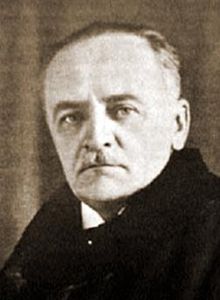Bohdan Lepky
It has been suggested that this article be checked to ensure a neutral point of view. (December 2009) |
This article's tone or style may not reflect the encyclopedic tone used on Wikipedia. (April 2017) |

Bohdan Lepky, (Ukrainian: Богдан Лепкий, November 9, 1872, Krehulets, Kingdom of Galicia and Lodomeria, Austro-Hungary – July 21, 1941, Cracow, General Government, Nazi Germany) was a Ukrainian writer, poet, scholar, public figure, and artist.
He was born on November 9, 1872, in the village of Zhukiv, in the same house where the Polish insurgent [1] once lived.
Education[]
At the age of six Bohdan was sent to a "normal school" in Berezhany, starting in second grade, and later attended grammar school there. Lepky would recall that most of the young Ukrainian and Polish students were noted for their ethnic tolerance, mutual respect, and openness, as well as active participation in choirs, stage productions, and concerts with both Polish and Ukrainian repertoire.
After completing grammar school in 1891, Lepky was admitted to the Academy of Arts in Vienna, but soon realized that literature was his true vocation. He then studied at Lviv University, graduating in 1895, and returned to the grammar school in Berezhany as a teacher of Ukrainian and German language and literature.
Years in Cracow[]
The writer's "Polish period" began in 1899, when Cracow's Jagiellonian University launched a series of lectures on Ukrainian language and literature and offered a chair to Lepky, who remained there for the rest of his life.
For Cracow's Ukrainian community, Lepky's house at 28, ulica Zielona. was a cultural hub where one could encounter many figures of Ukrainian scholarship and culture, including Kyrylo Studynsky, Vasyl Stefanyk, , , Mykhailo Boychuk, and others. Lepky also maintained a creative dialogue with Polish artists such as Kazimierz Tetmajer (1865–1940; a poet and prose writer, and author of the historical novel ), the playwright and painter Stanisław Wyspiański, and the poet Władysław Orkan.
Lepky is best known for his Polish translation of the ancient Ukrainian chronicle Słowo o pułku Igora (, 1905) and for the poem "Zhuravli" (Cranes, 1910), known to Ukrainians throughout the world as the mournful song "You see, my brother, my friend, the gray string of cranes flying off into the distance." Lepky said that one of Wyspiański's plays prompted him to compose this poem: "In the fall of 1910, in Cracow, I was walking home after viewing a theatrical production of Wyspianski's drama . The withered leaves rustled beneath my feet, and departing cranes were trumpeting high above. The poem seemed to come by itself, without my knowledge or effort. My brother set it to music."
Bohdan Lepky died in Cracow and is buried in the local Rakowicki Cemetery.
Literary works[]
- Cranes (You see, my brother - Ukr.: Видиш, брате мій) - 1910 - famous poem known to Ukrainians throughout the world as the song ("You see, my brother, my friend, a gray string of cranes soaring high into the sky...").
- Song lead (Ukr.: Заспів)
- Mazepa (Ukr.: Мазепа) - about Ivan Mazepa, Ukrainian hetman
- Away from life, small grief (Ukr.: Набік життя журбо дрібна)
- I’ve Lost Contact with You (prose poem) - 1906 - 2
- Nastya (Ukr.: Настя) - 1897 - 12
- In the Forest (Ukr.: В лісі)- 1896 - 9
- Revenge (Ukr.: Месть) - 1901
- Three Portraits - a book of memoirs in which he relates his encounters and creative relationships with Ivan Franko and Vasyl Stefanyk and reminiscences extensively about Władysław Orkan.
English Translations[]
Short story "Why?".[2]
Further reading[]
- The role of Bohdan Lepky in the rapprochement between the Ukrainian and Polish cultures, By Ihor SIUNDIUKOV, The Day
- Poetry and poems by Bohdan Lepky (in Ukrainian)
- Poetry of Bohdan Lepky (in Ukrainian)
References[]
- ^ Senkus, R. 1993, “Bohdan Lepky” in Internet Encyclopedia of Ukraine.
- ^ Lepky, B., 1998, Brother against Brother, pp.322-333, Language Lantern Publications, Toronto, (Engl. transl.)transl.)
| Wikimedia Commons has media related to Bohdan Lepky. |
- 1872 births
- 1941 deaths
- Eastern Catholic poets
- Jagiellonian University faculty
- People from Chortkiv Raion
- People from the Kingdom of Galicia and Lodomeria
- Translators of The Tale of Igor's Campaign
- Ukrainian poets
- Ukrainian translators
- University of Lviv alumni
